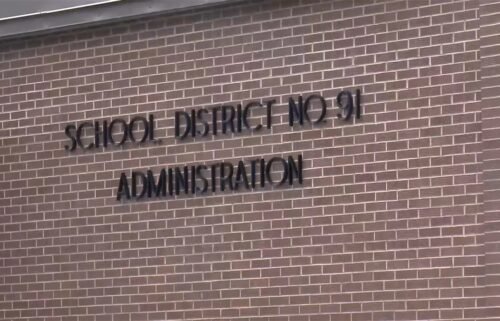Business schools embrace sustainability

metamorworks // Shutterstock
Business schools embrace sustainability
City skyline with icons of Green Business overlaid, concept of sustainable development.
Demand for “green skills” is growing faster than the sustainability workforce, according to recent reports, but business schools are stepping up to meet that demand.
A late 2023 LinkedIn report found that the share of job postings requiring at least one green skill rose by 22.4% between 2022 and 2023, but the share of green talent in the workforce rose by only 12.3%.
Those jobs increased even as job growth slowed globally over that period, according to the LinkedIn report, showcasing the high demand for that skill set.
Degrees and master of business administration (MBA) concentrations in sustainability are not new, but as demand for sustainability skills increases, business schools are responding by debuting degrees in sustainability and putting climate change at the forefront of their curricula.
Katherine Baird, associate director of sustainability at the University of California, Berkeley’s Haas School of Business, told BestColleges that sustainability is becoming an integral part of business education as student and employer demand increases.
Business students need to understand the concepts of sustainability to be a successful business leader across industries, Baird said. “So, when we talk about sustainability across (Berkeley) Haas, what we’re not talking about is a kind of siloed topic area or issue or set of classes that a few students take. What we’re really seeing is it being an integral component of our business education.”
Private enterprise is uniquely positioned to respond quickly to climate change and sustainability needs, Robert Hobbins, a clinical assistant professor of sustainability at the University of Colorado Denver (CU Denver), told BestColleges.
Businesses have the tools, the resources, the speed, and the ingenuity to lead the next transformation to a more sustainable economy, society, and environment, Hobbins said. “In order to get to that level, I think it’s very important to make sure that the students that are going to be taking over businesses, starting new businesses have the knowledge, tools, and skills to be able to lead that transformation.”
Innovative New Programs
Berkeley Haas and the CU Denver Business School both have long-standing sustainability efforts — and both plan to debut sustainability-focused degree programs in 2024.
CU Denver will launch a master’s degree in sustainable business in fall 2024. That degree combines sustainability with other key student interests, like flexibility, and features numerous stackable credentials to allow students to customize their education.
The program features certificates in a number of sustainability areas, including:
- Environmental Sustainability
- Sustainable Energy
- Risk Management and Resilience
- Social Enterprise
- Managing for Sustainability
- Urban Sustainability and Infrastructure
Hobbins underscored the importance of flexibility in shaping that curriculum. Like sustainability, flexibility is key to graduate business students in choosing a program. Hobbins said the new program offers both in-person and online options, as well as being highly customizable with standalone certificates.
Stackable certificates and online options are increasingly a fixture across business education, with a growing number of business schools offering students options in those areas.
Hobbins also underscored the interdisciplinary nature of sustainability education and cross-university collaboration to give business students a holistic look at sustainability and gain relevant, real-world knowledge in specific areas with certificates and in-degree concentrations.
“It’s important that our business students have deep disciplinary or topical knowledge on particular issues,” Hobbins said.
Berkeley Haas plans to launch a combined MBA and master of climate solutions program with the Rausser College of Natural Resources. That combined program can be completed in just five semesters. Students will spend their first year working on Haas MBA coursework. They will then move to study climate curriculum and policy at Rausser.
Baird underscored the collaborative, interdisciplinary nature of the dual degree program.
“Having this collaboration means that students can get a really strong business education, but then they can also, if they’re interested, get a really technical understanding of climate science and climate solutions,” Baird said.
That new dual degree program will complement long-standing sustainability efforts at Haas. Baird said sustainability is incorporated across Haas’ curriculum. The school also has a number of individual sustainability efforts, like its Cleantech to Market program, which features partnerships between graduate students at Haas and startups to commercialize cleantech solutions.
“Every student who comes to Haas graduates with a basic knowledge of sustainability issues and climate literacy,” Baird said, adding that the school also offers a number of specializations and concentrations for students who want to dive deeper into sustainability.
Haas also offers students a chance to do real-world sustainability investment work while in school. The school offers a class in which students manage a $4.5 million investment fund.
“We’re really looking at, you know, what is the market doing? Because this is a space that is moving forward so quickly, how are we making sure that we’re offering the most up-to-date curriculum?”
Business Students All-In on Sustainability
A recent Graduate Management Admission Council (GMAC) survey of prospective graduate business students found an overwhelming interest in sustainability. Roughly 68% of prospective graduate business students said sustainability was important or very important to their academic experience in that survey.
That interest has translated into action with MBA students from top universities signing a new pledge to combat climate change.
Students at schools such as University of Cambridge Judge Business School, Columbia Business School, Harvard Business School, Northwestern University Kellogg School of Management, Stanford Graduate School of Business, the University of Chicago Booth Business School, and the University of Pennsylvania Wharton School have signed on to the new Climate Legacy Commitment.
The goal, organizers say, is to build a coalition of like-minded peers, industry leaders, and partners that will shape corporate cultures and operational norms and deliver a sustainable, net-zero future.
“The climate crisis necessitates a fundamental transformation of the global economic framework, which will shape business strategies for decades to come,” Peter Golding, Cambridge MBA candidate and Climate Legacy Commitment co-founder, said in a release.
Both Baird and Hobbins underscored the importance of preparing students for a rapidly changing and ever-evolving climate landscape.
Haas is updating its curriculum at a rapid pace to teach students leadership skills and strategic thinking in addition to technical skills in areas like energy policy and sustainable investing, Baird said.
Hobbins, who teaches a class on environmental sustainability and stewardship that deals with how companies can partner with government entities and other groups to help their communities, said it’s important to discuss sustainability news and topics as they happen.
For instance, the new Securities and Exchange Commission (SEC) climate disclosure rules, support business models that can thrive in a low-carbon economy, he said. He also emphasized the importance of climate experts visiting and lecturing on campus.
“Systematically, it’s part of our program to be sharing the most cutting-edge information with our students,” Hobbins said.
Being in the vanguard of sustainability education also includes spotlighting stewardship and thinking about underserved communities when approaching climate and other environmental issues, Baird added.
“We don’t take the view that sustainability is simply a carbon problem or simply a kind of resource use problem,” Baird said. “We take a much more nuanced and kind of expansive view of the topic, and that’s also reflected in the curriculum and the opportunities that students have here.”
![]()
This story was produced by BestColleges and reviewed and distributed by Stacker Media.





